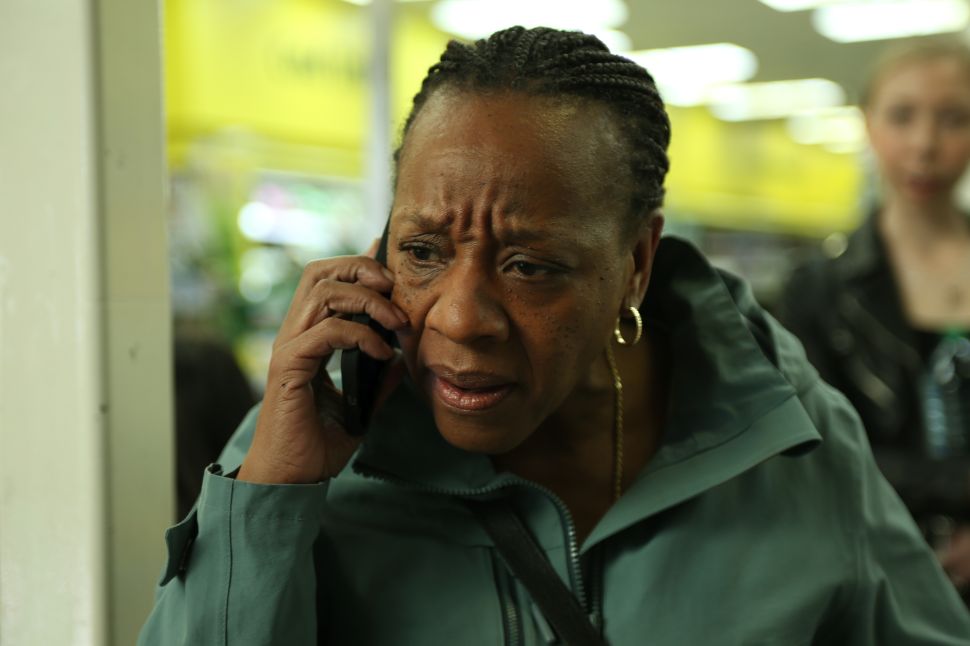Mike Leigh’s first movie in six years finds the writer-director back together with one of the stars of 1996 breakthrough, Secrets & Lies, Marianne Jean-Baptiste. Both Leigh and Jean-Baptiste earned Oscar nominations for Secrets & Lies (Best Director and Best Original Screenplay for him, and Best Supporting Actress for her), and smart money has them in contention for more of the same for Leigh’s latest. That would be Hard Truths, which emphatically elevates Jean-Baptiste to dazzling star status.
A nostalgic tug got this particular film rolling. Almost three decades had elapsed since Leigh made Secrets & Lies, and Jean-Baptiste popped into his head. “We haven’t been able to get together since then,” Leigh tells Observer. “So I thought, ‘Let’s get Marianne, and see what’s she is up to now.’”
The people that Leigh picks for his pictures largely determine the film’s setting and the story he wants to tell. Because of Jean-Baptiste, Hard Truths focuses on an extended Black family in North London. Jean-Baptiste is Pansy Deacon, a premenopausal naysayer who lashes out at family and strangers alike; also recruited from Secrets & Lies was Michele Austin, who plays Pansy’s sister Chantelle, a relative sunbeam compared to Pansy.
Pansy takes all manner of exception to life’s little flaws and imperfections. Delivering hard truths is a full-time job with her. Whether it’s a dental assistant or grocery-cashier, she wields a scorching blow-torch. Her day begins when she awakes with a blood-curdling yelp and ponders what’s ahead. This she reviews at the breakfast table, uninterrupted by her plumber husband (David Webber) and her slacker son (Tumaine Barrett). Long ago hammered into silence, they let her rant and rail to her mind’s discontent, then turn her loose on a poor, unsuspecting world.
“We live in a difficult society with all kinds of people,” reasons Leigh. “Nobody can say they can’t relate to somebody who’s a Pansy of some sort. The truth is that people don’t go around objectively analyzing each other. People live with what’s going on. They don’t criticize or question. It’s part of the condition of life. People are putting up with things and surviving and getting on with their own thing. Not everyone questions everything the way they do in movies.”
If Leigh’s characters don’t act the way people usually do in movies, that’s because Leigh builds his films around them, rather than dictate to them. “Truth is, I work the way bankers bank and novelists write novels and poets write poetry,” he says. “I interact with the material and discover what the film is through the process of making it.” Though he describes his work as “tightly scripted” (and certainly that’s how it plays) his movies aren’t scripted in the conventional sense. The scripts arise out of a rehearsal process that involves improvisation. “We arrived at what you see,” he says. “Everything was created on set. When we get to the shoot, we’ve worked it out through improvisations and converted that material from me and from the actors into action.” The improvisation sets the stage, but it’s not what’s filmed. “There’s not a single moment in this film that’s ad-libbed when we finally arrive on the set to shoot scenes,” says Leigh. “The crew comes and shoots the thing in a classical way in terms of film discipline.”
This process brings a sense of life as it’s lived to the screen. “I pull together a group of actors and work individually with each of them to find and create a character,” explains Leigh. “The characters are always pinned on real people the actors know personally. Then, together, we invent the characters’ personal history, their personalities, even some sense of how they move and think. The main thing that happens in the long period before we get to the shoot is that we bring into existence the world of the characters.”
Two-thirds of the way through Hard Truths, Pansy tips her vulnerability to the audience. “I just want it to stop,” she mutters more than once. Leigh ends the film ambiguously, without an answer to her plight. “She hands it over to me. I’ve done that quite often. It’s not a cop-out. It is important to me to leave a doorway with stuff to work on and to savor and to argue about.”
All of Leigh’s films are written and directed by him. He leaves the producing to others, gladly. “I can’t really talk in Hollywood-pitch language about where the idea of a movie comes,” he says. “Basically, it’s a straightforward thing. I’d say, ‘Give us the money to make the film. I can’t tell you what it’s about. We don’t know what it’ll be. I can’t discuss costumes. And please don’t interfere with us while we’re doing it.’” Amazingly enough this works, though it’s harder than it once was. “I’ve made 28 films, so I got away with it a lot—but, recently, it’s got tougher because there are all kinds of reasons that may or may not have to do with the story. I hear, ‘We really like what you’re doing, and we appreciate the way you work, but it’s not for us.’ ‘We’re not going to back a film if we don’t know what it is,’ ‘And we’re sure as hell not going to do a film where we can’t interfere with it and fuck it up.’”
At 81, Leigh still deals with hard truths. But he plans to be back before the cameras by year’s end.

